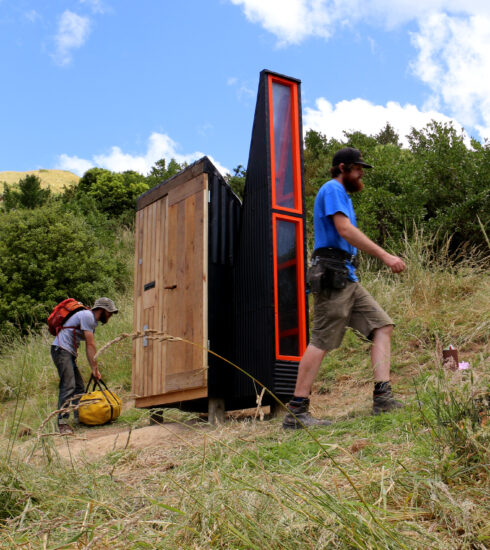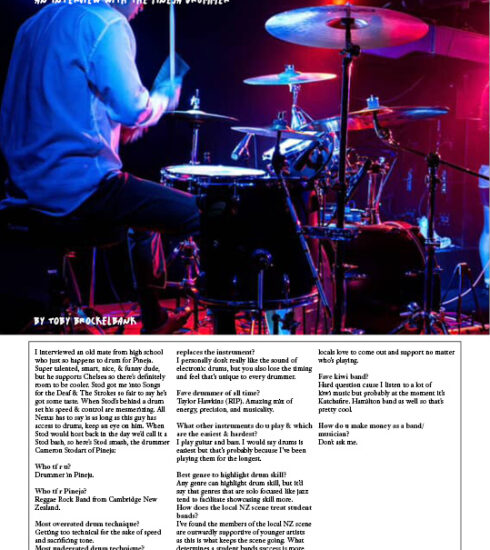Out of the Woods – Issue 2
Minister Woods. Labour Party Politician with a focus on what a lot of us love to hate- Housing and Urban Development. If you want to own a house in the future then this is for you. And even if you don’t think you’re one for reading the Housing Market you’d be somewhat surprised by what this interview entails. This interview is for everyone so take a peak.
James Shaw and the Greens constantly refer to my generation as the Rental
Generation. Is that Fair?
That’s not a term I would use. We know that there are many people who
would prefer to be buying their own home rather than renting, and how tough
it is for people, especially young people, to buy their first home. This is not a
problem that started recently. When we came into Government we inherited a
housing crisis where hardly any affordable housing had been built in the
preceding decade. So we’ve now got a situation where there is lots of demand
and not enough supply. Since we came into Government we’ve been working
on this issue, by increasing the supply of affordable housing – both through
KiwiBuild homes that are capped at affordable rates and encouraging new
supply through investment in infrastructure improvements for three waters
(drinking water/storm water/sewerage) and roading. Our commitment to the
biggest new public housing build programme in twenty years, with over 18,000
homes on track to be delivered by 2024 is playing a big part in this through our
Large Scale Projects. We’ve also got programmes to support people get on to
the housing ladder such as First Home Loans and Grants, and the Progressive
Home Ownership scheme that will help get between 1500 and 4,000 families
into affordable homes.
A fundamental belief of this Government is that every New Zealander should
be able to live in warm, dry, secure housing whether they are homeowners or
rent a home.
Is homeownership still relevant for Gen Z?
Absolutely, but we know it’s difficult, particularly following the dramatic surge
in prices in recent months. That was a big surprise as forecasts were predicting
the opposite as we were facing down COVID-19. So the economy has done a
lot better than we were expecting – because we all did so well with keeping
COVID contained. While that’s fantastic, the fact is we’re in a situation where
low interest rates has encouraged people to buy more houses, a lot of them
investors. So in recent months we’ve been reviewing how we can cool the
housing market by lowering demand from speculators who are adding more
fuel to the market. That’s why we are focussed on how we can enable the
building of more affordable homes and are preparing to crack down on
speculation on the housing market.
How are the changes to tenancy contracts going to impact students?
Our Government’s promise to rental reforms came into effect in February and
are there better reflect a modern-day rental environment. A key focus was to
improve security of tenure for tenants – including students – in a private rental
situation. Now fixed-term tenancies will convert to periodic tenancies upon
expiry, unless the landlord and tenant agree otherwise, the tenant gives
notice, or the landlord gives notice using one of the justified grounds. This
means students can stay in their tenancies the following year after their fixed-
term ends, if they want to. Tenants can also assign their tenancies so if
students need to leave a tenancy early, for example to undertake placement or
if they finish their course mid-year, they can avoid situations where they end
up paying double rent for a period of time. There are also new rules to ensure
tenants can make minor, reasonable, changes to their accommodation without
the risk of losing their bond, as well as further protections for tenants who are
successful at the Tenancy Tribunal over any tenancy matters, to get name
suppression. This means students can feel confident they won’t get blacklisted
by landlords when they’ve been successful in enforcing their rights
In simple terms, can you explain the present housing crisis and what that
means for young adults wanting to buy their first home?
There simply haven’t been enough houses being built at the affordable end of
the market for a couple of decades, particularly following the Global Financial
Crisis in 2008/9. So there is a shortage of housing but a lot of demand. That’s
been compounded in the last year or so, by very low interest rates and a host
of other factors which have made housing an even more attractive option for
investors. The prediction by economists last year as we were in the midst of
managing the response to COVID-19 suggested house prices were going to
take about a ten percent fall, so the upswing in house prices has been a real
surprise. But we’ve been looking at closely at what we can do to cool the
housing market and make it easier for people to buy their first home. So you’ll
be seeing announcements in the coming months about how we deal with the
demand side and how we can encourage more home building; for home
ownership as well as rentals to address that part of the market too. There’s no
doubt about it, it’s very tough to get into the market at the moment without a
decent deposit and we do have schemes available such as First Home Loans,
First Home Grants, KiwiBuild and the Progressive Home Ownership scheme
which can all assist people into home ownership.
Last year the median house price in Auckland reached $1 million along with
every region in NewZealand having record high medians. How are you tackling the high prices
and demand for
Housing?
As I’ve mentioned, we will be making announcements on what we will do to
tackle investor demand for housing and how we can encourage more supply of
affordable housing. But since we came into Government we have implemented
a massive programme of work on housing, apart from the big public housing
programme. This includes making major changes to the way councils consider
developments (National Policy Statement – Urban Development) that mean
more houses can be built and how they fund infrastructure for new housing.
We also did a review of the Resource Management Act and have committed to
its repeal with new legislation coming in to tackle the roadblocks to building
more housing, while ensuring we’re still looking after the environment.
Infrastructure is a really over-looked factor when it comes to building new
housing; it includes roading, accessibility to public transport and the all-
important ‘three waters’ (drinking water, storm water and sewerage) which
you need to put up new housing or intensify housing in existing suburbs. We
have been making a lot of effort and funding to improve infrastructure and our
public housing programme is key to this. As part of our commitment to deliver
over 18,000 new public and transitional housing places by 2024, we are
investing in infrastructure to support this and enable affordable and market
housing to be built. You can see good examples of this in our Large Scale
Projects which is transforming Auckland suburbs like Northcote, Mt Roskill and
Mangere among others, to host a range of housing to meet both public and
private housing needs.
Do you think the ‘New Zealand Dream’ of a quarter acre and a white picket
fence is still a relevant one? Is it a healthy dream to have?
I know that is still a dream for some people, but as you’d expect people have
to go further out from city and urban centres to get this type of property. A lot
of people are also keen to live in urban environments where they are closer to
work, school, public transport, places to bike and the amenities and lifestyle
you get in cities. Our demographic is changing and what people want from
their immediate living environment is changing too.
How do you take speculation out of the market?
We have been reviewing a range of advice on this and will have more to say on
this soon, but a key part of it is to ensure that the playing field is tilted less in
favour of speculators, so first home buyers get a good chance at getting into a
home.
Do you think that high-income families who own two or more (holiday)
houses is an ethical issue?
It’s not for me to say how people should spend their money. If holiday houses
are sitting empty in areas where there is a high need for that type of housing,
people could argue that is unethical. We simply need more houses in areas
where people want to live and work and – apart from Queenstown – that’s
probably unlikely to be in holiday hotspots where there might be holiday
homes that are empty for a period of the year.
Why is homeownership a racial, class, and now young adult issue?
At the heart of all of this is a housing affordability issue. We came into
Government knowing there is a housing crisis and we are determined to fix it.
We’ve laid a lot of important groundwork and that will bear fruit in the next
couple of years and beyond, but there is still more work to do and we will do
whatever we can to increase the supply of housing, whether that’s for home
ownership or for ensuring rental accommodation is more affordable. A key
priority for this Government has always been to ensure that New Zealanders
have access to warm, dry, secure housing whether they own their homes or
rent them.
The rhetoric from this government has always been geared toward lifting
people out of poverty and into homes, is that a reasonable attitude to have
with the current housing shortage and inflated market?
As I’ve outlined, we’re looking at how to increase the supply of affordable
housing and reduce speculative demand, and will have more to say soon. We
made good strides in addressing inequality in our first term, including the
Families Package which increased the incomes of low to middle-income
families, and increases to the minimum wage which goes up to $20 this year.
It’s a key priority for our Government to further our work in this area, and we
Is it really harder to purchase a house now than it was 20-30 years ago?
It’s difficult to make direct comparisons as there have always been some
people and groups who find it difficult to purchase a home because of all the
factors involved like housing supply and prices, household incomes, the
broader cost of living, inflation rates, interest rates and deposit requirements
etc. But we know i can be tougher for first home buyers and that’s why we’ve
got a range of programmes to help such as First Home Grants and Loans,
KiwiBuild and the Progressive Home Ownership scheme.
Is the decision to reintroduce LVR’s the end of opportunity for first home
buyers?
Not at all. The fact that LVR restrictions are higher for investors than owner
occupiers can open opportunities for first home buyers. There are also two
important exemptions to LVR requirements which could also help first home
buyers – for those who qualify for First Home Loans (which are targeted at first
home buyers on lower incomes) and for new build properties (which increase
the supply of housing overall) and KiwiBuild properties which are targeted at
first home buyers.
In the USA they have economic controls that allow people to fix mortgages at
low interest rates for the entire term of the loan, is this market manipulation
something the Government would consider legislating?
Treasury has not investigated this as a possibility.
What are your opinions on Landlords monopolising multiple homes, does
that hinder the chances for first-time buyers?
Private landlords serve a really important role in providing rental
accommodation and most operate with integrity, charging reasonable rents.
What we need is a lot more houses being built in the affordable range of the
market, as well as more options for rentals. There are significant opportunities
to get landlords and investors to look at getting into the Build-to-Rent market,
which would add to supply of housing
Why did the government decide to give up on a capital gains tax?
Labour campaigned on this issue numerous times and after we couldn’t get it
through Cabinet last term, the Prime Minister made a commitment that it
would not be introduced.
How has Covid impacted the housing market?
In unexpected ways as I’ve discussed with the estimates that the market would
fall because of the economic impact we were bracing for that didn’t arrive.
Is the government considering a National housing solar panel scheme to
reduce costs of electricity and create a shared grid?
We are not looking at this but we are trialling two programmes to put solar
panels on both Maori and public housing. Applications are already in for the
programme for Maori housing and we’ll be rolling out the public housing
scheme soon. These will give us a lot more information about how solar panels
might make a difference to people’s electricity bills.
Finally, housing and tenancy are big issues for the student market but
successive governments have tended to look at them in isolation.
The reality is that when they are compounded withstudent loans, a lack of student
allowance support, increased pressure on the postgrad student,a compressed
job market that has been flooded with over-qualified people, the increasing
strain on mental wellbeing (particularly at University), and the very real
chance that one day soon with fossil fuels and oil spills Hamilton will be
beachfront property what can we take away here?
These are very big questions, but what you can take away is that this
Government is determined to fix the housing crisis that was ignored for so long
under the previous government. We fundamentally believe every New
Zealander should have a warm, safe, secure home whether they are home
owners or renters and there is a massive programme of work going on in
changing the structural problems with not enough land, poor infrastructure
and planning rules that have favoured the status quo. We’ve made a really
good start, we’ve got new initiatives coming, but it will take more time. We’ve
secured better rights for tenants, more income for beneficiaries, we’re raising
the minimum wage and we are taking action on climate change with a plan to
reduce emissions and a commitment to decarbonising transport and industry
and having a 100% renewable energy electricity grid.
What is the message from the government that will restore our faith in
humanity and leave us with the notion that it will actually get better?
The fact that we are working on fixing what’s broken in terms of providing
more housing, investment in health and education to address the neglect in
those systems, that we look after our most vulnerable, while also making sure
we are as low-emissions as possible. I think COVID showed us what kind of
country we are when we all pull together to keep each other safe, and that’s
given me a lot of hope about what kind of place we all want New Zealand to





